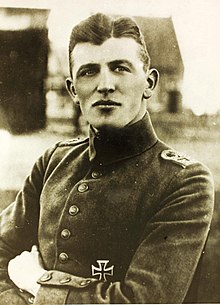Heinrich Kroll
Heinrich Claudius Kroll (born November 3, 1894 in Flatzby ; † February 21, 1930 in Geesthacht ) was a German fighter pilot in World War I , a knight of the order Pour le Mérite and one of the first German commercial pilots .
Childhood and youth
Kroll came from a village near Flensburg . Like his father Heinrich Karl August Kroll (main teacher at the Flatzby school from 1893 to 1906), he intended to become a teacher. In 1914 he passed his teaching exam in Kiel , where he was an active member of the Kiel gymnastics club during his visit to the teachers' seminar .
First World War
When the war broke out, Kroll volunteered for the Fusilier Regiment "Queen" (Schleswig-Holstein) No. 86 , with whom he went to the front in autumn 1914. Kroll was awarded the Iron Cross 2nd class in the heavy fighting at Hartmannsweiler- and Reichsackerkopf in southern Alsace and was promoted to lieutenant in the reserve in May 1915 .
Kroll decided to switch to the air force . In January 1916 he came as a pilot's student to Aviation Substitute Department 3 in Gotha , was ordered to Army Air Park 3 in Rethel for four days at the end of April 1916 and from there assigned to Field Aviation Department 17, which was deployed at the front in Champagne . Kroll was initially the only officer pilot in this unit. With a Rumpler CI with 160 HP engine he started with his observer, the lieutenant of the reserve and government trainee Holzhausen, for long-distance reconnaissance in the Reims / Épernay / Chalons / Sainte-Menehould area . In October 1916, Kroll received one of the two new Albatros aircraft with a 220 hp engine that had been assigned to the department and also flew bombing missions with it.
In November 1916, Kroll came as a fighter pilot to Jagdstaffel 9 in Tergnier . Awarded the Iron Cross 1st Class on February 12th, he was able to shoot down a French Caudron on February 26th, 1917 , but this was not confirmed as an aerial victory. On May 2, 1917, he succeeded in shooting down a Spad over Moranviller .
On May 25, 1917, Kroll fought a duel with one of the most successful French fighter pilots, René Dorme , who had already won 23 aerial victories. Over the Fort de la Pompelle near Reims, Dorme finally lost and fell. On July 1, 1917, Kroll was given command of the Jasta 24. Shortly afterwards, on July 27, 1917, Kroll himself was shot down while burning, but remained uninjured. He marked his new Albatros DV with a yin-yang symbol. On February 22, 1918, the German Crown Prince awarded him the Knight's Cross of the Royal House Order of Hohenzollern with Swords.
At the start of the great German spring offensive in March 1918, Kroll was also entrusted with the leadership of Jagdgruppe 12 of the 18th Army in the St. Quentin area near Villers-le-Sec , which, in addition to his Jagdstaffel 24, also included the two Jastas 44 and 79b.
On March 29, 1918, after Kroll had won his 20th victory in the air, he received the order Pour le Mérite. On June 1st he shot a captive balloon at a height of 5,000 m, on July 5th he shot down his 30th, at the same time the 70th victory of his squadron, followed by four more aerial victories. On August 14, 1918, however, he himself was hit. Despite his serious wound, he still managed to land his machine at the airfield near Omencour .
post war period
The end of the war led Kroll to Hamburg- Fuhlsbüttel as a first lieutenant in the reserve and demobilization officer , where he joined the Hamburg police in 1919 as captain . There he was also a witness of the unrest in the course of the Kapp Putsch in 1920 and participated in the recovery of the body of the former fighter pilot Rudolf Berthold , who led the local insurgent troops.
In 1922 Kroll left the police and initially worked as a businessman, but then took up active aviation again, initially in the Hamburg Aviation Association and from 1928/29 as a commercial pilot with the Hamburger Luftverkehrsgesellschaft mbH. He flew the Hamburg - Berlin route to the North Sea islands and also carried out sightseeing flights over Hamburg with a Junkers F 13 .
Resting place
On February 21, 1930, Kroll died of a lung disease and was buried in the Ohlsdorf cemetery in Hamburg.
literature
- Karl-Friedrich Hildebrand, Christian Zweig: The knights of the order Pour le Mérite of the First World War Volume 2: HO , Biblio Verlag, Bissendorf 2003, ISBN 3-7648-2516-2 , p. 284
Web links
- Short biography on Flieger-Album.de ( Memento from June 7, 2009 in the Internet Archive )
| personal data | |
|---|---|
| SURNAME | Kroll, Heinrich |
| ALTERNATIVE NAMES | Kroll, Heinrich Claudius (full name) |
| BRIEF DESCRIPTION | German fighter pilot in the First World War |
| DATE OF BIRTH | November 3, 1894 |
| PLACE OF BIRTH | Flatzby |
| DATE OF DEATH | February 21, 1930 |
| Place of death | Geesthacht |
